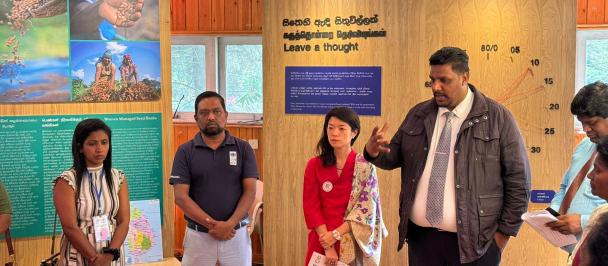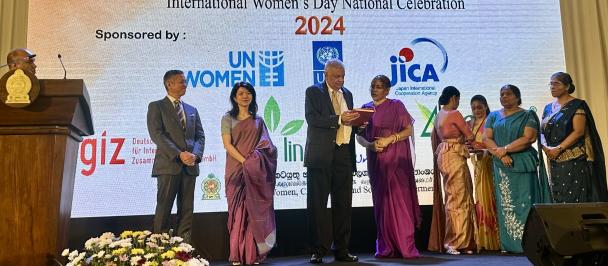Panelists at the ‘Break the Bias for a Sustainable Tomorrow’ International Women’s Day discussion.
Joint Press Release
24 March 2022, Colombo, Sri Lanka: Girls experience gender bias and discrimination from a young age which escalates as they grow older, affecting their full potential, autonomy, and equal participation in society. One of the main reasons for this disparity is the perception that women cannot or should not function in these spaces. These discriminatory biases often lead to violence against women and girls and makes them vulnerable to repression and poverty which are often exacerbated during crises, as seen in the ongoing COVID-19 pandemic. To raise awareness on this in commemorating International Women’s Month, the United Nations together with the UN Global Compact Network Sri Lanka hosted a discussion on ‘Breaking the Bias for a Sustainable Tomorrow’.
Speaking at the event, the United Nations Resident Coordinator in Sri Lanka, Ms. Hanaa Singer-Hamdy stated, “Research shows that Sri Lanka has the potential to add US$20 billion to its GDP if gender parity is addressed and the potential to increase its economic growth trajectory by about 14 per cent. The UN in Sri Lanka is using our upcoming Cooperation Framework to work with the Government and people of Sri Lanka to help achieve gender parity and realise the full engagement of women in the economic, political, and social spheres. By breaking the biases that hinder women from fully participating in formal places of power – we can ensure positive outcomes for all of society.”
The discussion, moderated by Mr. Kunle Adeniyi, Representative of UNFPA Sri Lanka, focused on unpacking gender biases within formal places of power and influence in Sri Lanka, with a particular focus on the political and economic spheres, in the context of broader ground-level analysis.
The panel comprised Ms. Shiranthi Rathnayake, Additional Director General, Department of National Planning, Ms. Hajar Alafifi, Chairperson, Unilever Sri Lanka, Mr. Ishan Dantanarayana, Group Chief People Officer Brandix and Mr. Gowthaman Balachandran, co-chair of the National Forum Against Gender Based Violence (GBV).
While women are well-represented in public administration in many countries, including Sri Lanka, they are significantly outnumbered by men in leadership and decision-making positions. This impacts decisions and policies which are at risk of gender biases including stereotyping the roles, abilities, and needs of women. Addressing this, Ms. Shiranthi Rathnayake, Additional Director General, Department of National Planning shared her thoughts on policy changes required to foster inclusive institutions which promote gender equality.
Drawing from their professional experiences, senior personnel from the private sector including Hajar Alafifi, Chairperson, Unilever Sri Lanka and Ishan Dantanarayana, Group Chief People Officer, Brandix shared best practices of integrating gender equality initiatives within their organizations while speaking on challenges in overcoming persisting biases in the workplace.
The discussion, which also featured, Mr. Gowthaman Balachandran, Chief of Party at Management Systems International who explored intrinsic gender biases which continue to prevail in Sri Lanka, ended with Ms. Ramaaya Salgado, Country Focal Point of UN Women addressing the gathering, taking stock of salient points discussed at the event.
Sustainable development is only possible in a gender-equal world. Women and girls are essential, effective and powerful leaders and change-makers. Without their leadership, knowledge, and participation in all spheres of life, it is unlikely that solutions for a sustainable planet and a gender equal world tomorrow will be realized. The United Nations and its agencies together with the UN Global Compact Network, Sri Lanka remains committed to taking the insights of this discussion forward in realizing a world where women’s rights are upheld and ultimately break the bias for a sustainable tomorrow.
***
UN Resident Coordinator and UN Women Focal point

 Locations
Locations




